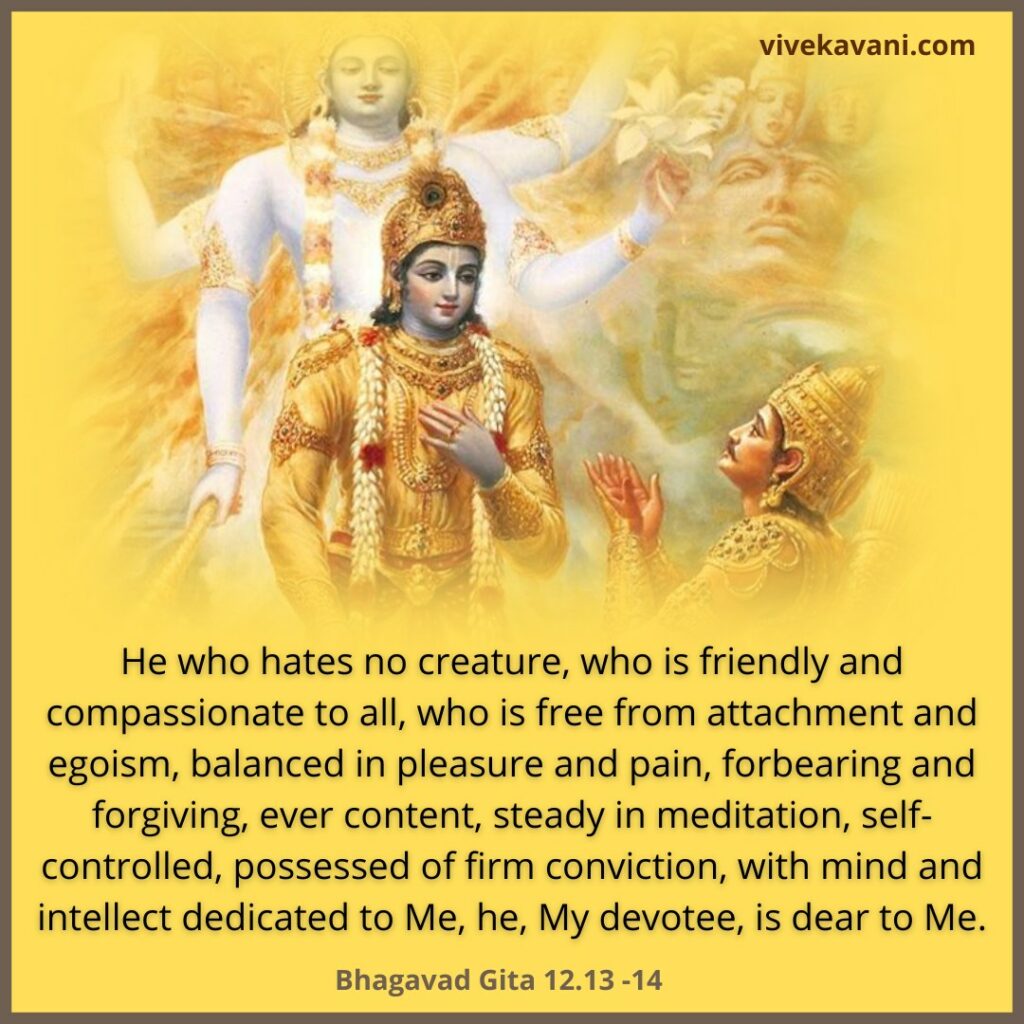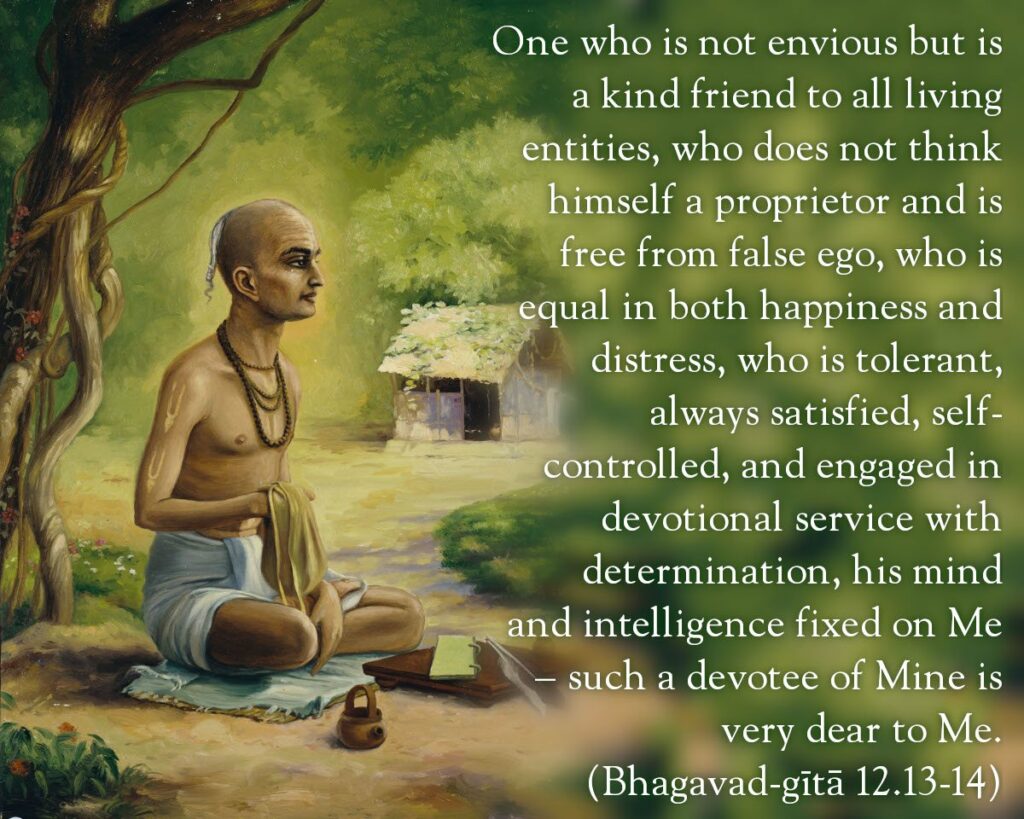अद्वेष्टा सर्वभूतानां मैत्र: करुण एव च |
निर्ममो निरहङ्कार: समदु:खसुख: क्षमी || 13||
सन्तुष्ट: सततं योगी यतात्मा दृढनिश्चय: |
मय्यर्पितमनोबुद्धिर्यो मद्भक्त: स मे प्रिय: || 14||
adveṣhṭā sarva-bhūtānāṁ maitraḥ karuṇa eva cha
nirmamo nirahankāraḥ sama-duḥkha-sukhaḥ kṣhamī
santuṣhṭaḥ satataṁ yogī yatātmā dṛiḍha-niśhchayaḥ
mayy arpita-mano-buddhir yo mad-bhaktaḥ sa me priyaḥ
adveṣhṭā—free from malice; sarva-bhūtānām—toward all living beings; maitraḥ—friendly; karuṇaḥ—compassionate; eva—indeed; cha—and; nirmamaḥ—free from attachment to possession; nirahankāraḥ—free from egoism; sama—equipoised; duḥkha—distress; sukhaḥ—happiness; kṣhamī—forgiving; santuṣhṭaḥ—content; satatam—steadily; yogī—united in devotion; yata-ātmā—self-controlled; dṛiḍha-niśhchayaḥ—firm resolve; mayi—to me; arpita—dedicated; manaḥ—mind; buddhiḥ—intellect; yaḥ—who; mat-bhaktaḥ—My devotees; saḥ—they; me—to Me; priyaḥ—very dear
Translation:
Who does not hate any being, who is friendly and compassionate, who is free from attachment and egoism, who is equal-minded in sorrow and happiness, who is forgiving, who is always contented, steady in meditation, who is self-controlled and firm in conviction, who has surrendered his mind and intellect in Me, he (such a devotee) is dear to me.
Commentary:
In seven verses the Lord ennumerates the qualities which His devotee should possess. Thirty five virtures are mentioned and the devotee who possesses them is dear to the Lord. Each one is a subject of study, and unless the sadhaka acquires perfection in all of them, he is not supposed to have passed the test of a devotee. Let no one imagine that he can by-pass any one of them and get into the higher class! If a man desires to cross over the ocean of samsara, free himself from sorrow and misery, he should attain perfection in these virtues, and on such a man alone descends the grace of God.
God is the same to all. He does not consider anyone to be hateful or dear to Him. Those who worship Him with devotion, He is in them and they are in Him. So acquiring good qualities, the devotee becomes dear to the Lord, and the Lord confers Atmajnana on him, and by it he attains Moksha. Each one of those qualities should be cultivated assiduously by all seekers.
Many may think that they have love for the Lord. That is not enough. They should know if they are the recipients of God’s grace. They should examine themselves and find out what is standing in the way of His grace freely flowing into him. If God’s grace is obtained everything is obtained, for His grace destroys all ignorance in a flash. The Lord is perfectly clear when he declares that only those devotees are dear to Him, who possess the above-mentioned qualities (Yo madbhaktah sa me priyah).
Paramatma is the goal to be attained. The path to reach the goal is sadhana, practice. The Gita expounds more on the practical side of sadhana than the goal to be attained. So it is known as a practical guide to self-realisation. In the Second Discourse, the Lord has explained the nature and state of the man of steady wisdom (Sthitaprajna). Here the nature and qualities of the devotee are stated. In the following Discourse, He declares the qualities of the Jnani. The Daivisampath is explained, starting with ‘abhayam‘ fearlessness. In this way, the practical side of religion is frequently emphasised by the Lord in various ways.
Let the aspirant think of these qualities and make them part and parcel of his life. The first is the absence of any trace of hatred towards any creature. There is no exception to this command. Love and kind feeling toward all creatures is the basic virtue of a bhakta.
Santushtah satatam: The devotee should be fully satisfied and contented. Discontent is a sign of imperfection. Under all circumstances, the devotee should be fully at rest and at peace with himself and the world.
Dhrdhanischayah: Firm conviction in spiritual life is again an indispensable quality. The difficulty with most seekers is that the mind wavers in crucial moments of life. Doubt crops up about the truth as declared by the Guru and Sastras. Does God exist or not? Such doubts cut at the very root of spiritual life. Firm conviction that Self-realisation is the goal of life is the foundation for all growth and advancement. No doubts and surmises and speculations! All these are the ‘tricks’ of Avidya which somehow tries to bring down the aspirant into the world and bind him to the wheel of samsara.
Mayyarpita manobuddhih: The mind and the intellect should be absorbed in the Lord. The intellect being the deciding power, if it is not linked to the mind, the latter disintegrates with hundreds of doubts and fear. Firm decision and immovable faith are essential.
Swami Vivekananda Says —
Now what is that good which is to be pursued? The good for him who desires moksha is one, and the good for him who wants dharma is another. This is the great truth which the Lord Shri Krishna, the revealer of the Gita, has tried therein to explain, and upon this great truth is established the varnashrama system and the doctrine of svadharma etc. of the Hindu religion. “He who has no enemy, and is friendly and compassionate towards all, who is free from the feelings of ‘me and mine’, even-minded in pain and pleasure, and forbearing” — these and other epithets of like nature are for him whose one goal in life is moksha.[Source]
The sattva prevailing, the man is inactive, he is calm, to be sure; but that inactivity is the outcome of the centralization of great powers, that calmness is the mother of tremendous energy. That highly sattvika man, that great soul, has no longer to work as we do with hands and feet — by his mere willing only, all his works are immediately accomplished to perfection. That man of predominating sattva is the Brahmin, the worshipped of all. Has he to go about from door to door, begging others to worship him? The Almighty Mother of the universe writes with Her own hand, in golden letters on his forehead, “Worship ye all, this great one, this son of Mine”, and the world reads and listens to it and humbly bows down its head before him in obedience. That man is really “He who has no enemy, and is friendly and compassionate towards all, who is free from the feelings of ‘me and mine’, even-minded in pain and pleasure, and forbearing.”[Source]

